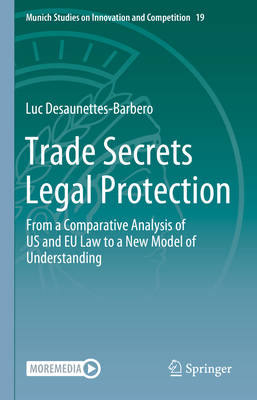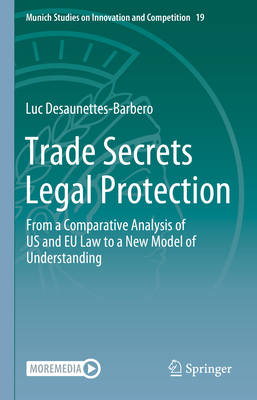
- Retrait gratuit dans votre magasin Club
- 7.000.000 titres dans notre catalogue
- Payer en toute sécurité
- Toujours un magasin près de chez vous
- Retrait gratuit dans votre magasin Club
- 7.000.0000 titres dans notre catalogue
- Payer en toute sécurité
- Toujours un magasin près de chez vous
Trade Secrets Legal Protection
From a Comparative Analysis of Us and EU Law to a New Model of Understanding
Luc Desaunettes-Barbero
168,95 €
+ 337 points
Format
Description
Despite the economic relevance of trade secrets, their legal protection is not based on a robust theoretical corpus, and a large uncertainty remains regarding how they should be legally apprehended. The present book investigates the foundations of their legal protection by assessing its justifications and aims to define how this legal apprehension should be organized.
The book starts with a comparative analysis of the US and the EU legal frameworks. It demonstrates the parentship existing between the two systems of protection and highlights that the incremental structuring of trade secrets protection has led to legal systems lacking broad-based conceptual foundations. In both legal orders, trade secrets rely on blurred protection, formally anchored in unfair competition, the strength of which, however, comes closer to that offered by intellectual property law. In this convoluted architecture, the judiciary is required to play a decisive role, especially at the enforcement stage. However, the absence of clarity concerning the telos of trade secrets protection leads to legal uncertainty, potentially incoherent enforcement, and, all in all, to inefficient outcomes from a welfare perspective.
The book then explores a theoretical framework based on a distinction between two legal objects: the undertakings' secret sphere and secret pieces of information. Securing the undertakings' secret sphere appears as a condition for the competition process to happen in an economy working under structural uncertainty. It requires objective regulations enforced by public authorities. On the other hand, the legal apprehension of secret pieces of information should be considered as falling within the realm of immaterial goods regulation aiming to solve the deficit of marketability of this type of good. This might call - after conducting a careful policy trade-off - for the establishment of relative (i.e. inter partes) subjective rights.
The book starts with a comparative analysis of the US and the EU legal frameworks. It demonstrates the parentship existing between the two systems of protection and highlights that the incremental structuring of trade secrets protection has led to legal systems lacking broad-based conceptual foundations. In both legal orders, trade secrets rely on blurred protection, formally anchored in unfair competition, the strength of which, however, comes closer to that offered by intellectual property law. In this convoluted architecture, the judiciary is required to play a decisive role, especially at the enforcement stage. However, the absence of clarity concerning the telos of trade secrets protection leads to legal uncertainty, potentially incoherent enforcement, and, all in all, to inefficient outcomes from a welfare perspective.
The book then explores a theoretical framework based on a distinction between two legal objects: the undertakings' secret sphere and secret pieces of information. Securing the undertakings' secret sphere appears as a condition for the competition process to happen in an economy working under structural uncertainty. It requires objective regulations enforced by public authorities. On the other hand, the legal apprehension of secret pieces of information should be considered as falling within the realm of immaterial goods regulation aiming to solve the deficit of marketability of this type of good. This might call - after conducting a careful policy trade-off - for the establishment of relative (i.e. inter partes) subjective rights.
Spécifications
Parties prenantes
- Auteur(s) :
- Editeur:
Contenu
- Nombre de pages :
- 501
- Langue:
- Anglais
- Collection :
- Tome:
- n° 19
Caractéristiques
- EAN:
- 9783031267857
- Date de parution :
- 11-06-23
- Format:
- Livre relié
- Format numérique:
- Genaaid
- Dimensions :
- 156 mm x 234 mm
- Poids :
- 902 g

Les avis
Nous publions uniquement les avis qui respectent les conditions requises. Consultez nos conditions pour les avis.






